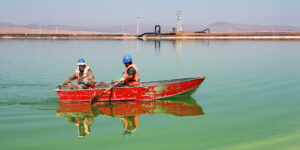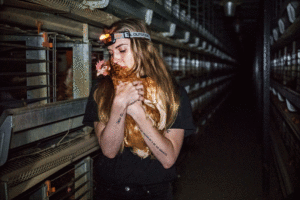Three bottlenose whales have come to Kaldbaksfjorður. They can be easily seen from the winding road that skirts the edge of the narrow sound, ten minutes’ drive from Tórshavn, the capital of the Faroe Islands. Two are adults, twice the size of bottlenose dolphins but equally playful. In the last few weeks, over 2,000 people have come to see them, bringing children and grandchildren to marvel as the animals jump clear of the water.
In Faroese, bottlenose whales (Hyperoodon ampullatus) are called døglingur. Apart from their stubby beaks they look very similar to pilot whales, the species most often seen here, in pods numbering several hundred. Faroese people flock to see the pilot whales, too — but usually when they are being driven ashore to be slaughtered in a riot of spume and spray, men hauling on ropes to drag them onto the sand while their blood turns the sea crimson.
The killing of the pilot whales is called grindadráp, a gory tradition in these north Atlantic islands, just 200 miles northwest of Shetland. Two weeks ago, I was in Tórshavn when a friend texted me to say there was a grindadráp on the small beach just outside the city centre. Having seen the slaughter up close several times, I did not linger, but as I drove past the beach, I could see the crowds of men with knives. Anyone who helps gets a free share of the meat, which is always communally distributed.
That day, 78 pilot whales were taken, arousing a slew of online campaigners to once again condemn the Faroese for their “barbarity” and “cruelty”. Online there are numerous pressure groups, including Sea Shepherd’s UK-based “Stop the Grind” and the Blue Planet Society. The environmental campaigner, Dominic Dyer, is calling for the UK to suspend trade with Faroes over the grindadráp. Anonymous supporters of such campaigns often describe the Faroese as “psychopaths” and “murderers”.
As an autonomous territory of the Danish Kingdom, the Faroes lie outside the EU. They are therefore exempt from its adherence to the International Commission on Whaling’s 1986 moratorium on all whaling, apart from aboriginal subsistence catches. (Grindadráp is a form of indigenous whaling similar to that legally practised in Greenland and Nunavut.) Japan, Iceland and Norway have chosen not to abide by the moratorium either, but report their catches to the ICW in the interests of science. In these countries, unlike Faroes, whale meat is sold in supermarkets and offered in restaurants, often to tourists.
Faroes’ own whaling regulations date back half a millennium: every catch made since the 16th century has been recorded by length and weight. The current whaling laws specify a limited number of beaches onto which the animals may be herded. If a community has recently killed whales, the local sheriff may refuse permission on the grounds that the meat is not needed. Only long-finned pilot whales, Atlantic white-sided dolphins and common bottlenose dolphins may be driven ashore. The long-finned pilot whale population is estimated to be around 700,000, and the Faroese catch — at the very most 2,000 annually but usually about half that — doesn’t make a dent. Faroese fishermen never go out in search of the animals, only beaching them if they are spotted by chance, and if there are enough people ready to kill them properly. The prescribed method of killing is not (as in Japan, Norway and Iceland) by explosive harpoon, but by a specially-designed spinal lance which ensures almost instantaneous brain death.
As a passionate marine conservationist, I find this all disturbing. I have swum with many species of whales, and they seem indisputably sentient. They look back at us with clear curiosity. And yet, cows also have the ability to recognise individual human faces, and we do not label British beef farmers “murderers” and “monsters”. Fond of whales as I may be, I am equally disturbed by the willingness of outsiders to condemn the Faroese. Those shouting loudest have no understanding of Faroese culture — of how the islanders have had to rely almost entirely on their natural surroundings for survival.
When inexpert outsiders, like me, ask how the Faroese can bear to kill pilot whales — animals we see as intelligent, magical visitors from another realm — they are often bewildered. “It’s meat,” they answer. “Do you cry when you eat a steak or a piece of bacon?” Others might remind us: “The pilot whales aren’t endangered: if they were, we would not kill them. We are fond of our sheep, but when it’s time to eat them, we kill them too.” When campaigners decry the pilot-whale slaughter, the Faroese reaction is that these emotions are a symptom of living in a “Disneyfied world” divorced from the reality of survival.
The Faroes have been settled for more than 1,000 years, but until the 20th century, this wet, windy, storm-tossed archipelago was largely cut off from the rest of the world by inclement weather and a lack of long-range sailing vessels. Able to grow only very few crops, the Faroese survived on fish and sheep. The Lutheran forebears of today’s islanders called the occasional catch of pilot whales “a gift from God”, and after a harsh winter they often made the difference between life and death.
Arguably, the Faroese don’t actually need whale meat to survive now, and many no longer eat it, due to heavy metal pollutants in the carcases. Creatures at the top of the marine food chain are always more polluted than those at the bottom, because the former consume the latter in vast quantities, multiplying the toxins. The Faroese health authorities have alerted the population to this danger. Because of this, some islanders argue that the number of pilot whales caught each year should be rationed.
Other islanders, however, believe that the grindadráp is symbolic of something much bigger. It’s a demonstration of independence, of an unwillingness to follow rules imposed by outsiders. The Faroese are often resistant to the idea of adopting a globalised way of life, whereby all meat is presented wrapped in plastic, and shipped-in from overseas. During the Covid pandemic, I often thought of my Faroese friends, who would manage even if global supply chains collapsed.
This tiny nation is aware of its vulnerability to outsiders. They trace their independent thinking all the way back to the conflict between Faroese chieftain Sigmundur Brestissson, who was tasked with converting the islands to Christianity by their Norwegian overlords in 1005, and another chieftain, Tróndur of Gøta, who retained his pagan beliefs. The latter is seen as a hero here.
The Faroes have no army. In the Second World War, they were occupied by the British. The writer Eric Linklater wrote in praise of the Faroese at the time: “Native hardihood and energy have conquered a hostile environment, and given to it gentility and grace; they have retained a primitive virtue … and appear to have escaped the vulgarity and inertia of civilisation”. We, in Britain, have forgotten that during the war as much as a fifth of our fish supplies came from Faroese trawlers which braved the U-Boats to sail the North Atlantic. As a nation, they lost one of the highest percentages of their menfolk to German attacks, prompting Churchill to thank them for their steadfastness and bravery. But now, we see not the valour in these tough, pragmatic islands but only barbarity.
A few days after the whales arrived at Kaldbaksfjorður, a Faroese friend was fretting about what would happen to them if they left the fjord, and the tide swept them onto the southerly island of Suðuroy. These whales occasionally strand themselves there, and in the settlement of Hvalba people are allowed to humanely dispatch the beached creatures, and eat the meat. I called my friend to discuss it. “It would be very sad,” he mused. “Having said that, I had some døglingur in the freezer and finished it last winter. So much tastier than pilot-whale.”
Disclaimer
Some of the posts we share are controversial and we do not necessarily agree with them in the whole extend. Sometimes we agree with the content or part of it but we do not agree with the narration or language. Nevertheless we find them somehow interesting, valuable and/or informative or we share them, because we strongly believe in freedom of speech, free press and journalism. We strongly encourage you to have a critical approach to all the content, do your own research and analysis to build your own opinion.
We would be glad to have your feedback.
Source: UnHerd Read the original article here: https://unherd.com/



